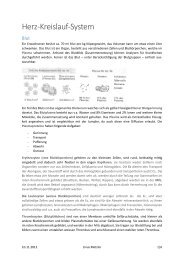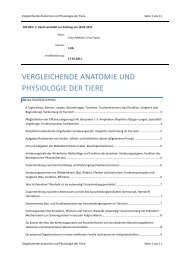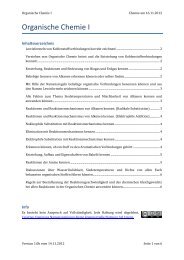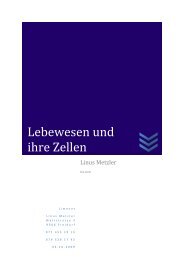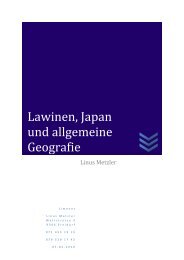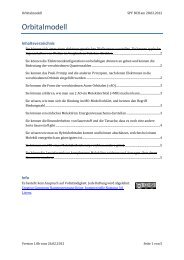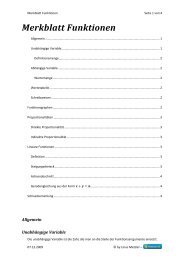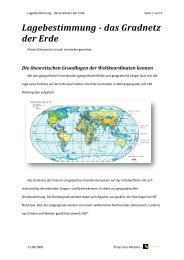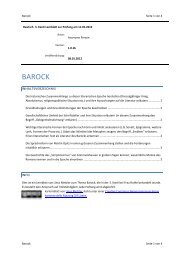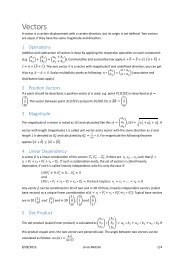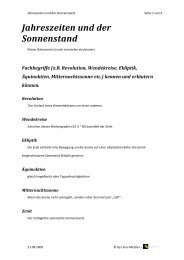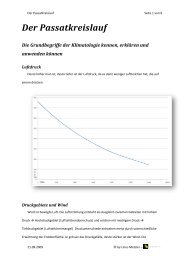From the Nazi Takeover to World War II - limenet.ch
From the Nazi Takeover to World War II - limenet.ch
From the Nazi Takeover to World War II - limenet.ch
- No tags were found...
You also want an ePaper? Increase the reach of your titles
YUMPU automatically turns print PDFs into web optimized ePapers that Google loves.
<strong>From</strong> <strong>the</strong> <strong>Nazi</strong> <strong>Takeover</strong> <strong>to</strong> <strong>World</strong> <strong>War</strong> <strong>II</strong> Ges<strong>ch</strong>i<strong>ch</strong>te am 3/15/2013<strong>From</strong> <strong>the</strong> <strong>Nazi</strong> <strong>Takeover</strong> <strong>to</strong> <strong>World</strong> <strong>War</strong> <strong>II</strong>Table of ContentsYou know <strong>the</strong> role of women in <strong>the</strong> <strong>Nazi</strong> state ...................................................................................................... 3You know <strong>the</strong> <strong>Nazi</strong>s’ youth policy ................................................................................................................................ 3You can describe <strong>the</strong> <strong>Nazi</strong>s’ economic policy and its <strong>ch</strong>anges....................................................................... 3You know how <strong>the</strong> <strong>Nazi</strong>s used violence (V) and seduction (S) <strong>to</strong> win <strong>the</strong> support of <strong>the</strong>German masses ...................................................................................................................................................................... 4You know who tried <strong>to</strong> resist <strong>the</strong> <strong>Nazi</strong> regime and how .................................................................................. 5You know <strong>the</strong> goals of Hitler’s foreign policy and <strong>the</strong> major steps from 1933 <strong>to</strong> 1939 ................... 5You can describe <strong>the</strong> foreign policies of o<strong>the</strong>r European powers facing <strong>the</strong> <strong>Nazi</strong> policybetween 1933 and 1939 ................................................................................................................................................... 8You understand and can explain how <strong>the</strong> <strong>Nazi</strong>s managed <strong>to</strong> consolidate <strong>the</strong>ir power in1933/34 ..................................................................................................................................................................................... 8You can explain <strong>the</strong> failure of resistance .................................................................................................................. 9You can explain why <strong>the</strong> <strong>Nazi</strong>s <strong>ch</strong>anged <strong>the</strong>ir economic policy and who benefitted from thispolicy ........................................................................................................................................................................................... 9You can explain <strong>the</strong> mutual impacts of <strong>the</strong> foreign policies of <strong>the</strong> USSR, Germany, France andBritain on ea<strong>ch</strong> o<strong>the</strong>r .......................................................................................................................................................... 9You can explain whe<strong>the</strong>r <strong>Nazi</strong> domestic policy also served <strong>Nazi</strong> foreign policies .............................. 9You can explain <strong>the</strong> <strong>ch</strong>anges in <strong>Nazi</strong> foreign policy ............................................................................................ 9You can interpret <strong>the</strong> debate about an economic crisis in 1939 as a reason for war .................... 10You can assess <strong>the</strong> <strong>Nazi</strong> economic policy .............................................................................................................. 10You can assess <strong>the</strong> question who was really in control of <strong>the</strong> Third Rei<strong>ch</strong> ......................................... 10You can evaluate different views whe<strong>the</strong>r Hitler had planned <strong>the</strong> outbreak of <strong>the</strong> war ............. 10You can evaluate criticism and justification of <strong>the</strong> appeasement policy .............................................. 10You can assess <strong>the</strong> German-Soviet non-aggression pact of 1939 ............................................................. 11You can assess <strong>the</strong> (in)evitability of <strong>the</strong> outbreak of WW <strong>II</strong> ....................................................................... 11Version 1.0b from 3/12/2013 Page 1 of 11
<strong>From</strong> <strong>the</strong> <strong>Nazi</strong> <strong>Takeover</strong> <strong>to</strong> <strong>World</strong> <strong>War</strong> <strong>II</strong> Ges<strong>ch</strong>i<strong>ch</strong>te am 3/15/2013InfoThere is no claim for completeness. All warranties are disclaimed.Creative Commons Attribution-Noncommercial 3.0 Unported license.Version 1.0b from 3/12/2013 Page 2 of 11
<strong>From</strong> <strong>the</strong> <strong>Nazi</strong> <strong>Takeover</strong> <strong>to</strong> <strong>World</strong> <strong>War</strong> <strong>II</strong> Ges<strong>ch</strong>i<strong>ch</strong>te am 3/15/2013Study PartD = Germany, I = Italy, JP = Japan, F = France, GB = Great Britain, US(A) = United States of America,USSR = Soviet Union, CZ = Cze<strong>ch</strong>oslovakiaDates are written in American mm/dd/(yy)yy or mm/(yy)yy format.Use Google – <strong>the</strong> internet is FULL of stuff about <strong>Nazi</strong>s & WW<strong>II</strong>!Factual KnowledgeYou know <strong>the</strong> role of women in <strong>the</strong> <strong>Nazi</strong> state- Awards <strong>to</strong> women (e.g. if <strong>the</strong>y gave birth <strong>to</strong> many <strong>ch</strong>ildren)- Fast reproduction – more soldiers- To fight against unemployment, women were dismissed and made <strong>to</strong> produce babies- Racial promotion of Aryan women- Creating a feeling of community & bringing in<strong>to</strong> line- If a woman didn’t find a man, she could volunteer <strong>to</strong> have a baby from an Aryan SS officerYou know <strong>the</strong> <strong>Nazi</strong>s’ youth policy- Establishment of youth organizations su<strong>ch</strong> as <strong>the</strong> “Hitler-Jugend”, whi<strong>ch</strong> was split up bysex and age and organized strictly hierar<strong>ch</strong>ically- One wasn’t obligated by law <strong>to</strong> join but huge social pressure- Certain [religious] groups couldn’t be members- O<strong>the</strong>r youth organizations were prohibited (sports clubs were still allowed, though)- Many pull fac<strong>to</strong>rs: adventure make friends, travel, parental pride, physical activity,power & career, outdoor activity as soldier training, training of typical female activities(<strong>the</strong> last two being a preparation for war)You can describe <strong>the</strong> <strong>Nazi</strong>s’ economic policy and its <strong>ch</strong>anges 1On 2nd May, 1933, Adolf Hitler ordered <strong>the</strong> Sturm Abteilung (SA) <strong>to</strong> arrest Germany'strade union leaders. Robert Ley formed <strong>the</strong> Labor Front (DAF), <strong>the</strong> only unionorganization allowed in <strong>the</strong> Third Rei<strong>ch</strong>.A pay freeze was introduced in 1933 and this was enforced by <strong>the</strong> Labor Front. Wageswere now decided by <strong>the</strong> Labor Front and compulsory deductions made for income tax,and for its Strength through Joy program. The Labor Front issued work-books thatrecorded <strong>the</strong> worker's employment record and no one could be employed without one.The government banned <strong>the</strong> introduction of some labor-saving ma<strong>ch</strong>inery.Employers had <strong>to</strong> get government permission before reducing <strong>the</strong>ir labor force.The <strong>Nazi</strong> government gave work contracts <strong>to</strong> those companies that relied on manuallabor ra<strong>the</strong>r than ma<strong>ch</strong>ines. This was especially true of <strong>the</strong> government's massiveau<strong>to</strong>bahn program.The <strong>Nazi</strong>s concentrated on rearming. Thousands of Germans worked in fac<strong>to</strong>riesproducing weapons.1 Partly based on http://ats<strong>ch</strong>ool.eduweb.co.uk/reds<strong>ch</strong>l/his<strong>to</strong>rydocs/Germany%201919-1939%20GCSE/<strong>Nazi</strong>%20Economic%20Policy%201933.docVersion 1.0b from 3/12/2013 Page 3 of 11
<strong>From</strong> <strong>the</strong> <strong>Nazi</strong> <strong>Takeover</strong> <strong>to</strong> <strong>World</strong> <strong>War</strong> <strong>II</strong> Ges<strong>ch</strong>i<strong>ch</strong>te am 3/15/2013You know who tried <strong>to</strong> resist <strong>the</strong> <strong>Nazi</strong> regime and howAttacking parties- Religious groups› Moral reasons› Were put in<strong>to</strong> CC- Military› General von Stauffenberg› Trying <strong>to</strong> assassinate Hitler› Traditionalists; wanted“traditional warfare”› killed- Youth & student groups› Revels› Alternative <strong>to</strong> HJ› Pacifists› arrested- traditional elite› Old-fashioned, against(Hitler’s) democracy› Didn’t consider Hitler as aproper leader (Hitler’s familybackground)› arrested & killed- Left parties› Different political views› Dissolved› Guerilla actions› Exile› CCProtective layers- Collabora<strong>to</strong>rs- Indifferent masses (HUGE), would’vebeen needed for popular uprising, butdifficult <strong>to</strong> motivateYou know <strong>the</strong> goals of Hitler’s foreign policy and <strong>the</strong> major steps from 1933 <strong>to</strong> 1939The aims of Hitler’s Foreign Policy were:To reverse <strong>the</strong> terms of <strong>the</strong> Treaty of Versailles.To make Germany a great world power again.To unite all German speaking people.To rearm Germany and res<strong>to</strong>re all its lost terri<strong>to</strong>ries.To conquer an Empire in <strong>the</strong> East <strong>to</strong> give Germany Lebensraum (living space).The aims of Hitler’s Foreign Policy were based on <strong>the</strong> ideas of:The Master Race (The <strong>Nazi</strong> racist idea that Germans as an Aryan people were a “masterrace” destined <strong>to</strong> rule “subhuman” peoples like Slavs.)Pan-German Nationalism (The belief that all German speaking peoples should be unitedin one Greater Germany.)Version 1.0b from 3/12/2013 Page 5 of 11
<strong>From</strong> <strong>the</strong> <strong>Nazi</strong> <strong>Takeover</strong> <strong>to</strong> <strong>World</strong> <strong>War</strong> <strong>II</strong> Ges<strong>ch</strong>i<strong>ch</strong>te am 3/15/2013Militarism (The use of military force <strong>to</strong> solve a countries problems is better than peacefulnegotiations.)Social Darwinism (The <strong>the</strong>ory that in <strong>the</strong> world it was natural for stronger countries <strong>to</strong>conquer and rule weaker countries.) 2Hitler's foreign policy from 1933-1939 was based on two aspects: expansionism and arm race.Since he <strong>to</strong>ok over <strong>the</strong> presidency after <strong>the</strong> death of <strong>the</strong> president, he made it his goal <strong>to</strong> annex <strong>to</strong><strong>the</strong> Rei<strong>ch</strong> every terri<strong>to</strong>ry where <strong>the</strong>re were Germans living <strong>to</strong> create his 'breathing room'.He began by ordering <strong>the</strong> re-militarization of Rhineland, whi<strong>ch</strong> was a DMZ 3 as of 1919, asestablished by <strong>the</strong> Treaty of Versailles. France during this time period had a huge panic <strong>to</strong> warand thus, was completely subordinated <strong>to</strong> Great Britain's appeasement policy. Because of thisFrance just asked Hitler not do it but Hitler did it anyway. As I mentioned before, due <strong>to</strong> <strong>the</strong>irappeasement policy, Great Britain didn't do anything <strong>to</strong> s<strong>to</strong>p him, thinking 'if we give him wha<strong>the</strong> wants, <strong>the</strong>n maybe he'll relax', whi<strong>ch</strong> he didn't ra<strong>the</strong>r, <strong>the</strong> international tensions created byhis expansionism gave him an excuse <strong>to</strong> start a rearmament policy, whi<strong>ch</strong> was forbidden by <strong>the</strong>Treaty of Versailles, his goal <strong>to</strong> destroy it was one of <strong>the</strong> reasons Germany voted for <strong>the</strong> <strong>Nazi</strong>s in<strong>the</strong> 1933 elections, and Great Britain didn't do anything <strong>to</strong> s<strong>to</strong>p him, again because of <strong>the</strong>irpolicy.Then <strong>the</strong>re was <strong>the</strong> failed coup by <strong>the</strong> Austrian <strong>Nazi</strong> party, whi<strong>ch</strong> was fueled and supported byHitler, whi<strong>ch</strong> began with <strong>the</strong> assassination of <strong>the</strong> Austrian Prime Minister. This was beforeMussolini and Hitler became close friends, and as Austria was both one of Hitler's greatestaspirations (remember that Hitler dreamed of annexing Austria in<strong>to</strong> <strong>the</strong> Rei<strong>ch</strong>, given <strong>the</strong> factthat he was Austrian) and one of Mussolini's expansion areas. Because of this, Mussolini sent histroops <strong>to</strong> <strong>the</strong> Italian-Austrian border threatening <strong>to</strong> invade if <strong>the</strong> <strong>Nazi</strong>s tried <strong>to</strong> take over. Hitlerdidn't have a large force back <strong>the</strong>n and he didn't want <strong>to</strong> risk a conflict with Italy ei<strong>the</strong>r, so heclaimed he didn't know anything about it.Also, <strong>the</strong> Sudetenland annexation. Hitler, using <strong>the</strong> principles of nationalities, demanded <strong>to</strong>Cze<strong>ch</strong>oslovakia <strong>to</strong> give up this region. Mussolini intervened and suggested <strong>the</strong> celebration of aconference in Muni<strong>ch</strong>. The outcome was favorable for Hitler's intentions and he annexed <strong>the</strong>region. After every neighbor of Cze<strong>ch</strong>oslovakia’s <strong>to</strong>ok terri<strong>to</strong>ries from it after this, Hitler <strong>to</strong>okwhat was left of Cze<strong>ch</strong>oslovakia for himself, and began plans for <strong>the</strong> annexation of Poland. InMuni<strong>ch</strong>, Great Britain saw <strong>the</strong> truth behind Hitler's intentions and threatened <strong>to</strong> go <strong>to</strong> war if hewent after Poland, same as France. Two days after Hitler invaded Poland, breaking <strong>the</strong> nonaggressionpact he signed with <strong>the</strong>m in 1934, Great Britain and France declared war, beginningWW<strong>II</strong>.Due <strong>to</strong> Great Britain's appeasement policy, Stalin thought <strong>the</strong> West was conspiring against himand in his paranoia, <strong>the</strong> USSR signed <strong>the</strong> Molo<strong>to</strong>v-Ribbentrop non-aggression pact with <strong>Nazi</strong>Germany, that had secret clauses that stated that <strong>the</strong> USSR and Germany would divide Polishterri<strong>to</strong>ries in case of war. Of course, due <strong>to</strong> his hatred for communism and Stalin, Hitler broke<strong>the</strong> pact and invaded <strong>the</strong> USSR. 42 Paragraph based on http://www.aller<strong>to</strong>ngrange.org/docs/Hitlers_Foreign_Policy_1933_-_1939.doc3 Demilitarized zone4 Paragraph based http://answers.yahoo.com/question/index?qid=20101210134106AAzsxGl, shortenedVersion 1.0b from 3/12/2013 Page 6 of 11
<strong>From</strong> <strong>the</strong> <strong>Nazi</strong> <strong>Takeover</strong> <strong>to</strong> <strong>World</strong> <strong>War</strong> <strong>II</strong> Ges<strong>ch</strong>i<strong>ch</strong>te am 3/15/2013Incident Date Cause/intention/justificationWithdrawalfrom <strong>the</strong>League ofNationsNonaggressionpact withPolandPlebiscite in<strong>the</strong> SaarConscription/rearmamentAnglo-GermannavalagreementRhinelandoccupationAxis Rhome-Berlin & Anti-CominternPactAustria’s“Ans<strong>ch</strong>luss”Oc<strong>to</strong>ber19, 1933France didn’tagree on <strong>the</strong>disarmament1934 No more armedconflict for tenyears signal forno warsJanuary13, 19351933-1939June 18,1935Mar<strong>ch</strong> 7,1936Oc<strong>to</strong>ber29, 1936Mar<strong>ch</strong> 12,1938End of <strong>the</strong> reign of<strong>the</strong> League ofNationsLebensraum, Lostpride of Germany,“Help”underdevelopedcountriesattempt for betterrelations betweenGB and Germany,Germany though<strong>to</strong>f it as anti-Franceand anti-SovietUnionprovocation, “itbelongs <strong>to</strong>Germany” (Hitler)anti-communistincreased pro-<strong>Nazi</strong> movementsin Austria; HitlerS<strong>ch</strong>us<strong>ch</strong>niggdecided upon(wasbullied/threatened by Hitler)ConsequenceLeague of Nations failedPoland isn’t able <strong>to</strong>support France destroyanti-German alliancesSaarland back underGerman reign, Prestigeboost for Hitler;propaganda &psy<strong>ch</strong>ological effect onsimilar terri<strong>to</strong>riesCarl von Ossietzky won aNobel Price for <strong>the</strong>disclosure of <strong>the</strong>rearmament policy in1935, triggeredrearmament policy of <strong>the</strong>UKregulate <strong>the</strong>Kriegsmarine’s size <strong>to</strong> afixed <strong>to</strong>tal <strong>to</strong>nnage <strong>to</strong> be35% of <strong>the</strong> Royal Navy;larger than limited in <strong>the</strong>Treaty of VersaillesGB & France <strong>to</strong>ok nocounter-actionAxis Powers formed;German breaks out ofisolationAustria is a part ofGermanyViolationVersaillesNoNoNo (part of it)YesYes, but GB’sconsentYes, noreactionNoYesVersion 1.0b from 3/12/2013 Page 7 of 11
<strong>From</strong> <strong>the</strong> <strong>Nazi</strong> <strong>Takeover</strong> <strong>to</strong> <strong>World</strong> <strong>War</strong> <strong>II</strong> Ges<strong>ch</strong>i<strong>ch</strong>te am 3/15/2013You can describe <strong>the</strong> foreign policies of o<strong>the</strong>r European powers facing <strong>the</strong> <strong>Nazi</strong>policy between 1933 and 1939- GB & F: appeasement policy 5› Muni<strong>ch</strong> Conference: decided about future of Sudetenland without CZ beingpresent› Securing peace at CZ’s expense› F: memory of WWI still present› GB & F: preoccupied with imperial policy- USA› Long-time isolation (briefly interrupted in WWI & 1929); continued until 1941when <strong>the</strong> US were attacked by Japan at Pearl Harbor› Didn’t play a role in outbreak of WW<strong>II</strong>› Rearmament because of pacific region conflicts (more afraid of JP than of D)- USSR› High potential, but not as developed as US› Some positions as US› Isolated but not as <strong>the</strong>ir own <strong>ch</strong>oice (communism from 1917 on); until German-Soviet non-aggression pact of 8/1939UnderstandingYou understand and can explain how <strong>the</strong> <strong>Nazi</strong>s managed <strong>to</strong> consolidate <strong>the</strong>ir powerin 1933/34- Enabling Act› The German word Ermä<strong>ch</strong>tigungsgesetz usually refers <strong>to</strong> <strong>the</strong> enabling act ofMar<strong>ch</strong> 23, 1933, officially Gesetz zur Behebung der Not von Volk und Rei<strong>ch</strong> ("Law<strong>to</strong> Remedy <strong>the</strong> Distress of <strong>the</strong> People and <strong>the</strong> State"). It became a corners<strong>to</strong>ne ofAdolf Hitler's seizure of power. Unlike, for example, <strong>the</strong> Wilhelm Marx enablingact of December 1923, Hitler's act• was limited <strong>to</strong> four years, not several months• enabled government not only <strong>to</strong> create decrees, but even laws andtreaties with o<strong>the</strong>r countries• <strong>the</strong>se laws could deviate from <strong>the</strong> constitution• <strong>the</strong>re were no <strong>the</strong>matic limits› nei<strong>the</strong>r any house committee nor <strong>the</strong> Rei<strong>ch</strong>srat (<strong>the</strong> common organ of <strong>the</strong>German regional states) had <strong>the</strong> right <strong>to</strong> control, or <strong>to</strong> abolish <strong>the</strong>se laws- 5/2/33 ending trade unions, replaced by DA; membership compulsory, no right<strong>to</strong> negotiate fake- 2-7/33 all political parties abolished- 7/14/33 Germany is officially a 1-party state- Until 1/34 parliaments in <strong>the</strong> Länder dissolved and centralization of power in Berlin- 1933 12% of public service people replaced unfinished revolution5 „Appeasement is a diplomatic policy aimed at avoiding war by making concessions <strong>to</strong> an aggressor.”(Wikipedia)Version 1.0b from 3/12/2013 Page 8 of 11
<strong>From</strong> <strong>the</strong> <strong>Nazi</strong> <strong>Takeover</strong> <strong>to</strong> <strong>World</strong> <strong>War</strong> <strong>II</strong> Ges<strong>ch</strong>i<strong>ch</strong>te am 3/15/2013You can explain <strong>the</strong> failure of resistanceThere was no success as no cooperation was done – although having <strong>the</strong> same goals.You can explain why <strong>the</strong> <strong>Nazi</strong>s <strong>ch</strong>anged <strong>the</strong>ir economic policy and who benefittedfrom this policy- 1933 – 1936satisfy workers & employers <strong>to</strong> gain public support; increased difficulty for foreignpowers <strong>to</strong> interfere; investing in infrastructure and reduce unemployment rate & makepropaganda- 1936 – 1939“Four Year Plann” 6› To increase agricultural production.› Retrain key sec<strong>to</strong>rs of <strong>the</strong> work force.› Government regulation of imports and exports.› To a<strong>ch</strong>ieve self-sufficiency in <strong>the</strong> production of raw materials.› Being a left idea, a right party ought not <strong>to</strong> <strong>to</strong>u<strong>ch</strong> <strong>the</strong> economyYou can explain <strong>the</strong> mutual impacts of <strong>the</strong> foreign policies of <strong>the</strong> USSR, Germany,France and Britain on ea<strong>ch</strong> o<strong>the</strong>rPlease also see related aims.- F & GB mutually “confirmed” ea<strong>ch</strong> o<strong>the</strong>r by continuing <strong>the</strong>ir appeasement policy, whi<strong>ch</strong>in turn gave Germany <strong>the</strong> impression <strong>the</strong>y could do whatever <strong>the</strong>y wanted with nointervention- D tried <strong>to</strong> please GB/F and USSR both at <strong>the</strong> same time- GB & F used D as an anti-communist buffer against <strong>the</strong> USSR- see also: Muni<strong>ch</strong> Conference vs. German-Soviet non-aggression pactYou can explain whe<strong>the</strong>r <strong>Nazi</strong> domestic policy also served <strong>Nazi</strong> foreign policiesVery often, those two policies served ea<strong>ch</strong> o<strong>the</strong>r on various occasions, su<strong>ch</strong> that <strong>the</strong> economicpolicy 1033 served as a preparation for war while <strong>the</strong> Olympics against soo<strong>the</strong>d foreign powersand <strong>the</strong> propaganda about “Grossdeuts<strong>ch</strong>es Rei<strong>ch</strong>” was a signal for <strong>the</strong> will <strong>to</strong> expand in 1939.You can explain <strong>the</strong> <strong>ch</strong>anges in <strong>Nazi</strong> foreign policy 7<strong>From</strong> 1933–1938, Konstantin von Neurath, a conservative career diplomat, served as Germanforeign minister. During his tenure, Germany followed a revisionist policy aimed at overcoming<strong>the</strong> restrictions imposed on Germany by <strong>the</strong> Treaty of Versailles and seizing <strong>the</strong> diplomaticinitiative from Britain and France. Germany withdrew from <strong>the</strong> League of Nations; began rapidrearmament; signed a nonaggression pact with Poland; reacquired <strong>the</strong> Saar terri<strong>to</strong>ry through aplebiscite; militarily assisted <strong>the</strong> supporters of Francisco Franco in <strong>the</strong> Spanish Civil <strong>War</strong>; andremilitarized <strong>the</strong> Rhineland.<strong>From</strong> 1938–1945, Joa<strong>ch</strong>im von Ribbentrop, a <strong>Nazi</strong> party member and former ambassador <strong>to</strong>Great Britain, served as <strong>the</strong> foreign minister. During <strong>the</strong>se years, Germany streng<strong>the</strong>ned its ties<strong>to</strong> Fascist Italy and <strong>to</strong> Japan by signing <strong>the</strong> Anti-Comintern Pact, whi<strong>ch</strong> aimed <strong>to</strong> combat6 http://www.his<strong>to</strong>rylearningsite.co.uk/four_year_plan.htm7 Based on http://www.ushmm.org/wlc/en/article.php?ModuleId=10005203Version 1.0b from 3/12/2013 Page 9 of 11
<strong>From</strong> <strong>the</strong> <strong>Nazi</strong> <strong>Takeover</strong> <strong>to</strong> <strong>World</strong> <strong>War</strong> <strong>II</strong> Ges<strong>ch</strong>i<strong>ch</strong>te am 3/15/2013international communism, <strong>the</strong> Pact of Steel (with Italy), and <strong>the</strong> wartime Three-PowerAgreement (with Italy and Japan).In 1938, Germany acquired new terri<strong>to</strong>ries using <strong>the</strong> threat of war. In February, Hitler pressuredAustrian <strong>ch</strong>ancellor Kurt S<strong>ch</strong>us<strong>ch</strong>nigg in<strong>to</strong> signing <strong>the</strong> German-Austrian agreement(Ber<strong>ch</strong>tesgaden Diktat), whi<strong>ch</strong> brought <strong>Nazi</strong>s in<strong>to</strong> <strong>the</strong> Austrian cabinet. The next month,Germany carried out <strong>the</strong> Ans<strong>ch</strong>luss, <strong>the</strong> annexation of Austria. Hitler <strong>the</strong>n began demanding asolution <strong>to</strong> <strong>the</strong> Sudeten crisis, a conflict over <strong>the</strong> Sudetenland (a region of Cze<strong>ch</strong>oslovakia settledlargely by ethnic Germans). On September 30, 1938, British prime minister Neville Chamberlain(an advocate of appeasement), Fren<strong>ch</strong> premier Edouard Daladier, Italian prime minister Beni<strong>to</strong>Mussolini, and Hitler signed <strong>the</strong> Muni<strong>ch</strong> agreement, whi<strong>ch</strong> ceded <strong>the</strong> Sudetenland <strong>to</strong> Germany. InMar<strong>ch</strong> 1939, Germany occupied and dismembered <strong>the</strong> rump Cze<strong>ch</strong>oslovak state.In August 1939, Ribbentrop signed <strong>the</strong> German-Soviet Nonaggression Pact. A temporarydeviation from Germany's normally anti-Communist foreign policy, this agreement allowedHitler <strong>the</strong> freedom <strong>to</strong> attack Poland on September 1, 1939, without fear of Soviet intervention.Britain and France, Poland's allies, declared war on Germany on September 3, 1939. Hitler'saggressive foreign policy resulted in <strong>the</strong> outbreak of <strong>World</strong> <strong>War</strong> <strong>II</strong>.InterpretationYou can interpret <strong>the</strong> debate about an economic crisis in 1939 as a reason for war- Hitler somehow had <strong>to</strong> be able <strong>to</strong> get more resources and this would justify a war.You can assess <strong>the</strong> <strong>Nazi</strong> economic policySee respective learning aim in <strong>the</strong> “Factual Knowledge” sectionYou can assess <strong>the</strong> question who was really in control of <strong>the</strong> Third Rei<strong>ch</strong>Hitler himself was not <strong>to</strong>tally a political leader, it was more of him being interpreted by hisministers. Hitler didn’t know everything nor did he have everything under control. However,<strong>ch</strong>aos also had its benefits; no ministers, emotions as guides and easier <strong>to</strong> handle than law &order.You can evaluate different views whe<strong>the</strong>r Hitler had planned <strong>the</strong> outbreak of <strong>the</strong>war 8- A <strong>ch</strong>ance <strong>to</strong> realize “Lebensraum Ost”- Gain resources/raw materials- “revenge” for Versailles- Sooner or later, <strong>the</strong> USSR would attack, so attack West fast <strong>to</strong> prevent two-front-war, asalso Stalin knew, Hitler would attack at some timeYou can evaluate criticism and justification of <strong>the</strong> appeasement policy- Morally unacceptable- Serious contribution <strong>to</strong> <strong>the</strong> outbreak of WW<strong>II</strong>8 See alsohttp://wiki.answers.com/Q/What_was_<strong>the</strong>_most_important_reason_<strong>to</strong>_<strong>the</strong>_outbreak_of_world_war_2Version 1.0b from 3/12/2013 Page 10 of 11
<strong>From</strong> <strong>the</strong> <strong>Nazi</strong> <strong>Takeover</strong> <strong>to</strong> <strong>World</strong> <strong>War</strong> <strong>II</strong> Ges<strong>ch</strong>i<strong>ch</strong>te am 3/15/2013You can assess <strong>the</strong> German-Soviet non-aggression pact of 1939- Signed a few days before <strong>the</strong> outbreak of WW<strong>II</strong>- Between an anti-fascist and an anti-communist state- Public part:› No aggression against ea<strong>ch</strong> o<strong>the</strong>r› Cooperation ex<strong>ch</strong>ange of intel› No support for 3 rd party if ei<strong>the</strong>r of <strong>the</strong>m was attacked› Diplomacy- Secret part› Could be used as an excuse <strong>to</strong> start war war guilt question› Hinting at a war› 3 rd parties/states were decided upon illegally- Reasons› D: wanted <strong>to</strong> prevent a two-front war, so if <strong>the</strong>y attacked in <strong>the</strong> west, no attackfrom <strong>the</strong> east would come; contradicts “Lebensraum Ost”› Share terri<strong>to</strong>ries (Poland & Baltics) as <strong>the</strong>se states weren’t strong and both sideswanted part of <strong>the</strong>m› USSR: afraid of two-front war with D&JP as a D-I-JP pact existed; JP startedalready in 1936 war; D couldn’t fulfill both pacts at <strong>the</strong> same time› USSR could win time (attack from D) and could use D as an anti-communistbuffer from <strong>the</strong> west› Hitler had an ally (no o<strong>the</strong>rs)› USSR felt excluded as wasn’t invited <strong>to</strong> Muni<strong>ch</strong>You can assess <strong>the</strong> (in)evitability of <strong>the</strong> outbreak of WW <strong>II</strong>If you think some people can be made guilty for its outbreak, <strong>the</strong>n it would’ve been evitable, ifyou think it was “<strong>the</strong> course of his<strong>to</strong>ry”, it would’ve been inevitable.Version 1.0b from 3/12/2013 Page 11 of 11



